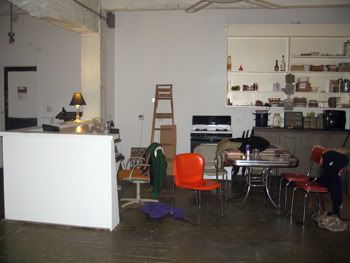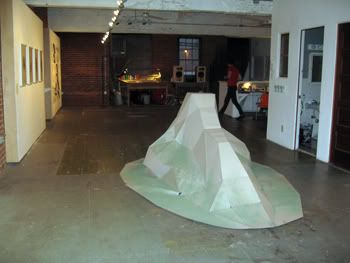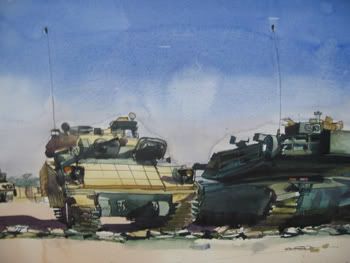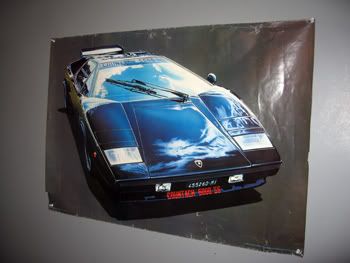
Over Christmas I journeyed back to my hometown; Cincinnati, Ohio and caught up with an old classmate, Paul Coors, who also happens to be one of the founders of one of the best independent non-commercial, artist-run galleries in the country. Publico Gallery, located at 1308 Clay Street in the under-privileged neighborhood of Over-the Rhine and at publicoart.com via the internet, was opened five years ago, quickly becoming a beacon of culture in the vast desert of the mid-west.
Paul plans to shut Publico's doors this month, hosting a final hurrah that you can find out more about on the website, so I thought it was the perfect time to ask him why he feels the need to quit, and learn a bit from the things he learned.
Unsurprisingly, the conversation hit home and Mr. Coors was able to articulate some of my own thoughts about artist-run out-of-pocket gallery ventures (Publico was probably one of the biggest inspirations for my own participation in Black Floor and Copy gallery) as well as make some optimistic points about the future of using the internet to create your own art culture.
If you're more a listener then a reader, please try out my newest inter-web adventure by checking out this interview on my podcast.
THIRTEEN MONTHS AFTER WE OPENED AND BARRY MCGEE WAS IN MY LIVING ROOM
Annette: When did you start Publico?
Paul: January of 2003.
Annette: What was your first show?
Paul: It was called Wintry Mix and it was a group show of the three founders, who are myself, my brother Matt [Coors] and Dan Reddinger.
Annette: When you say founders what does that mean?
Paul: The people that lived here at the time and built all the walls and stuff.
Annette: How has Publico been a part of the art community here in Cincinnati? How has the community responded?
Paul: We started holding fund-raisers to fund the gallery, we've never been a non-profit or anything like that. I've always felt that that's a good way to not only provide cheap art to people in the community but also so people in the community have the opportunity to support what you're doing. The first year anniversary show was about that in particular, as it was basically a way for local artists to provide a service or action for their local gallery.
Annette: I really liked that show, do you wanna talk about it?
Paul: Sure. Yeah. I don't have the press release in front of me. . .
Annette: You don't have to spell it out. Actually don't. If that show wasn't important to you. . .
Paul: Oh, I can talk about it. . .
Annette: Let's talk about what shows were important to you. What shows were important for you?
Paul: Nearly every show has been important to me in one way or another. There are the big obvious examples; the satellite exhibition for the Beautiful Losers show, Good World. . .
Annette: That brought in a lot of big names to the gallery didn't it?
Paul: Yeah. That was, what? Thirteen months after we opened and Barry McGee was in my living room which was pretty cool.
So that was obviously important. That was actually the show right after the one year anniversary show, which I forgot to mention was called WINTERRemix and the first show was called Wintry Mix. We often have really bad puns in our titles.
HOW DID YOU RUN THIS PLACE ANYWAYS? (A WHOLE LOT OF HEART AND NOT A LOT OF MONEY/TIME)
Annette: Is membership pretty much the same? is there a lot of turn-over? Do you even call it membership?
Paul: We call it membership just for a word to call it.
Annette: Do you pay dues?
Paul: We tried that. We had meetings once a week and we tried to do this thing where at every meeting people would throw five bucks in a pot, and that was good and it was a good way to do things but people have to remember to do things. I have to remember to put the jar out and these people are my friends, so there's a lot of catching up to do, joking around and coming up with stupid titles. Dana Ward is one of the funniest people I ever met in my life.

Publico's kitchen/front desk.
Annette: And he's one of the people helping out with the gallery now?
Paul: Yeah. Some people have moved on, my brother is in grad school in San Diego right now. The people currently involved are myself, Dana, who I just mentioned, Britni Bicknavor, Beth Graves, Russell Ihrig, Matt Waldbillig, Evan Commander. . . I believe that's it. That's seven right?
Annette: I wasn't really counting.
Paul: If I left anyone out you can check it out on our brand new website.
Annette: I know! You finally got your new website and now you're closing down. . .
Paul: I think that's kind of poetic. Being that I'm doing so much, I run a bar now (The Gypsy Hut), I am am artist myself. . . curating shows here, I've shown in shows in the past. . .PR I'm not very good at, and I feel like it's just one extra thing on my plate that I'm not very good at. . .
Annette: You must be alright at it. The gallery's gotten pretty much recognition considering where it's located and what you're doing.
Paul: Yeah. I'm getting to that. You can think of it like it's a gimmick, and a lot of the press does this which really used to piss me off, that the gallery is in our living room, basically.
My standpoint has always been, from the very beginning, that we have to operate on a very professional level, and professional can mean a number of different things.
Annette: Yeah.
Paul: It's not just monetary, because obviously this has nothing to do with money.
HOW DO YOU SAY PROFESSIONAL?
Annette: So what does professionalism mean for Publico?
Paul: I don't know, how do I say professional? You put on good shows, and if the person who is interviewing you from a paper who is a lifestyles writer who doesn't really know that much about contemporary art uses gimmicks like 'it's in their apartment, blah, blah, blah'. . . then whatever.
How do you know what good art is? You look at a lot of art, you read, I don't know, you talk to cool people. You hold yourself to the same level that the people you admire hold themselves to.
Annette: Does Publico have an aesthetic?
Paul: People could always say that. I do design most of the show announcements, posters, web. . . I design at least ninety-five percent of anything that radiates out from the gallery.
Annette: If you had to describe your aesthetic what is it?
Paul: I don't even want to go down that road.
Annette: No? Try it.
Paul: Um.
Annette: I mean. I could say that usually I come to a show here and it's very clean.
Paul: Okay, but clean is such an odd thing to say. . .
Annette: I don't think it's so odd and I don't mean it in a negative way.
THE HOUSE ART SHOW AND THE HOUSE MUSIC SHOW
Paul: I would say that I lean to more polished things, in general, but that can go in a lot of different directions. I feel we've had a lot of variety in the shows here.
If you look at our website you can see that a lot of the things I've designed, and I harp on the fact that it's my design because the things I've designed have become the closest thing to an identity for the gallery outside of the gallery walls, and these things have my personal aesthetic, which is not necessarily Publico's total aesthetic.
Annette: Yes. But, I would go as far as to say that it seems to match what goes on inside the gallery walls.

Publico from the back.
Paul: I think so. I think that goes back to the level of professionalism that has taken this place beyond the level of the 'isn't that cute they have a gallery in their apartment'. We actually have good shows here and show relevant contemporary work.
Annette: Have you seen a gallery in someone's apartment that you would say is a non-professional gallery?
Paul: I would never say that. If someone is putting a gallery in their apartment I applaud that. I don't rag on people who are trying to do a good thing.
Although you can compare the two and people do, the house art show is way different then the house music show. The house music show is a one-night performance, but the house art show? There is so much more planning that goes into it.
I don't want to pigeon-hole myself into anything, to be honest with you, there could be a really good, crazy, house art show.
DO EVERYTHING THE BEST YOU CAN AND TRY TO DO IT BETTER NEXT TIME
Annette: The "Publico collective" had a show at Vox Populi in Philadelphia and I was struck by how much the work looked like it belonged together.
Paul: It did didn't it? That's something that we all agreed on post-show too; We looked like a unit. But if you take those works out of context, piece-by-piece there isn't a whole lot of similarity.
Annette: The themes are all very different, but the execution of the ideas seems to run a similar path. It looks like you all speak the same visual language.
Paul: Basically, if the gallery had a mission statement I would say it was; Do everything the best you can and try to do it better next time, but there is no mission statement for the gallery.
SO WHY STOP?
Annette: Why are you shutting the doors?
Paul: Some of my favorite times here have had to do with people coming in from out of town.
Annette: The shows that have included people from out of town?
Paul: Yes. For instance, there are no local artists in this current show, and that's nothing I was trying to do, it just sort of happened that way. Ironically the show is called Local Color.

A Steve Mumford watercolor from Publico's current exhibition, Local Color.
Annette: But it's exciting? Having people from out of town?
Paul: It's exciting. Yeah. It brings people into the city and that starts to erode some of the negative feelings that people have about this city. This city, Cincinnati, has this whole self-hatred problem, that's just stupid.
Annette: What is that self-hatred?
Paul: It's just a drag, it's in the mid-west, there's not enough culture and stuff.
You know, there are things that are really beautiful about living in the mid-west and there are other things that are just an up-hill battle. There is less culture. You have to have a thicker skin to live here, because homophobia and bigotry of all kinds are much more prevalent here. Living in Over-the-Rhine, which is an underprivileged neighborhood has definitely changed my life. Where am I going with all this?
Annette: What's next?
Paul: Oh, yeah. Why am I quitting? I like bringing people in from out of town. These last couple of years especially I've just put myself in these situations where I've been really abusive to my body and haven't slept. There have been these monumental installation periods that are pretty taxing. I've worked with some great people like David Ellis, who's ten years older then me and pushes himself ten times harder. I really look up to that guy. I've learned a lot and benefitted from working with people like him here but I've started to realize that I don't need to be curating twelve shows a year. I could curate two or three and learn just as much.
The bottom line for me right now is that I've got to start putting my own work first. I've been putting it second for the past five years, I've been putting pretty much everything in my life second for the past five years.
Five years is a good run for a space like this. I have lost so much money.
IT COSTS MONEY. I DON'T HAVE MONEY. IT TAKES TIME.

A poster that hangs in Publico's bathroom that is super-awesome.
Annette: Why is five years a good run?
Paul: This is why: It costs money. I don't have money. It takes time. I have very little time. It's taxing. Our fund-raiser money from last year has been gone for the past six months so it's all coming from my pocket.
Annette: But why was it important to run the gallery the way you ran it? In a way that pretty much assures you of making no money?
Paul: For one thing it's liberating to not have to rely on the gallery needing to make money. The gallery doesn't really need to make that much money. Our costs aren't that much. From time to time the costs are more but I have a pretty good job now so I'm more then happy to step up and give money to the things that I'm passionate about.
Once you cross a commercial line you're going to eventually have to sacrifice some degree of freedom. This way we can show stuff we really care about and we can bring stuff into Cincinnati that people want to see. The mid-west can be just as viable a location for culture and to live in as the coasts.
THE MID-WEST
Annette: Did you feel a need to prove that?
Paul: Not at first. Now I do. At first it was pretty base; 'I know a lot of people who make great work and they need a place to show' but I've grown up a lot in the past five years, you start to learn things and ideas evolve.
Yeah, I do. We get people coming in from all over the country, musicians come from wherever, the coasts, or whatever highly populated city and they're really impressed. They like it. They feel the energy, they say 'Cincinnati is cool' and I'm always seconding that. It's a cool place, and then you start to think, if I can live in the mid-west, and this place is ridiculously cheap. If I can live here, have a huge place that's great, have a good job-I bar tend now, I only work three days a week and live totally comfortably. I have four days a week that up to this point has awarded me the opportunity to run a gallery-what else can I do? I can travel. I can go put my own shows on. I can curate maybe one show a year and still bring people into Cincinnati which I like doing. It's just possible. It is.
Creative to me is energy and new. Consistent reconsideration. Part of that energy to me is rebellion and if fifty percent or more of the creative people in my generation are moving to the coasts, there's just this natural teenager in me that says 'fuck that, I'm not doing that shit.'
I'm constantly wanting to do things better and I've found myself recently reflecting on how I can be more effective as an artist in 2008, globally. I start to think about how good I actually have it here and it's 2007 for gosh sakes, e-mail is so easy. All these people (gestures to the space around him). . .
THE INTERNET
Annette: You curated this show by e-mail?
Paul: Oh, yeah. Everybody except for this one guy here in the middle I e-mailed cold.
Annette: That's how I roll as well.
Paul: E-mail cold. That's one thing I've learned; how easy it is to hang out with cool people if you really want to. If you are doing something cool, artists, creative people, they just want to meet other creative people and feel the vibe.
Annette: So. Wait. Is this all about being cool?
Paul: I'm just using dumb words. I mean meeting interesting people, people who are going to spawn inspiration in myself.
No. It's really just about being an effective artist in the world, e-mail and the internet are both super-awesome and free. I feel like we're at this threshold moment. . . I don't know.
Annette: Yeah. No. I feel like it's possible to be global and local. . .
Paul: And be poor.
3 comments:
i'm not sure it's fair to say that the midwest is a vast culture-less desert. we need to stop perpetuating the myth that the coasts are the only places where thinking people congregate.
i think that was the point.
i think that was the point
Post a Comment